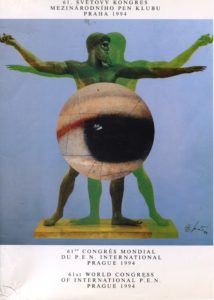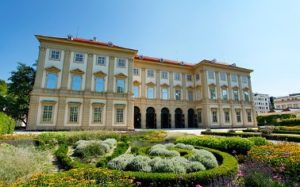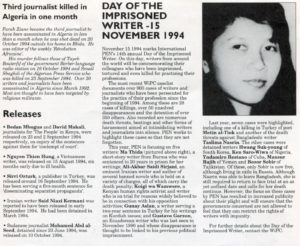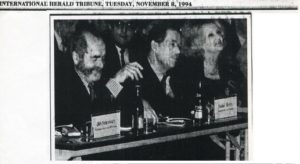Posts Tagged ‘61st PEN Congress’
PEN Journey 12: Tolerance on the Horizon?
PEN International celebrates its Centenary in 2021. I’ve been active in PEN for more than 30 years in various positions and now as an International Vice President Emeritus. With memories stirring and file drawers of documents and correspondence bulging, I am a bit of a walking archive and have been asked by PEN International to write down memories. I hope this personal PEN journey might be of interest.
It was a time of hope, the year when Nelson Mandela and Frederik de Klerk joined in free elections in South Africa, when Yasser Arafat, Yitzhak Rabin and Shimon Peres shook hands and began to live side by side, when the Irish Republican Army and the Ulster Defense Association laid down their arms after twenty-five years of terrorist conflict. The idea of tolerance quivered in the imagination in 1994 even if the realization of tolerant societies still seemed an imaginative leap.

As theme of the 61st PEN Congress, tolerance also challenged the ethnic, national and religious intolerance that gripped dozens of countries in the last decade of the twentieth century. In retrospect the time was perhaps not so different from times since, but we felt we were standing on an historic threshold. The PEN Congress theme of tolerance expressed this hope and optimism.

Liechtenstein Palace, garden view
Writers from over 75 PEN centers* around the world came together in Prague that fall for literary and working sessions. The Congress was a grand affair with public gatherings in stately ballrooms, including the Liechtenstein Palace, home of the Prague Academy of Music. Writers who had been imprisoned under the old Soviet regime, including Václav Havel, now ran the country.
Guests of honor included novelist and poet Taslima Nasrin, whom PEN had recently helped extract from the threat of death in Bangladesh (see PEN Journey 11). For protection she was driven around in a state car, and because Sara Whyatt, coordinator of the PEN’s Writers in Prison Committee (WiPC), and I agreed to look after her, we at times found ourselves whisked from meeting to meeting with a police escort, not the usual transport at a PEN Congress.
Though PEN had no mechanisms to change societies, to the extent society changed individual by individual, PEN worked for the writer, turning a spotlight on cases of abuse and challenging the laws which legitimized intolerance.
The voice of the individual writer has always been the most compelling testimony. My report to the Assembly of Delegates that year as Chair of the Writers in Prison Committee focused on those voices:
“Yes, I can hear birds singing. But they are not my friends. They are too far from me. My best friends are spiders and mantis. They are only living things to watch amusedly in my solitary cell. I live and play with them all day long. This excerpt is from a prisoner ten years into a twenty-year sentence written to his PEN minder.
“The image of the spider recurs in the writings of prisoners. One former prisoner I met shortly after taking over as Chair of this committee had come to London to receive treatment for the torture he’d endured. He told of being handcuffed to a generator outside during monsoon season, of not being allowed to wash, using a bucket as a toilet, his arms and hands wrapped around the generator for weeks. Then he talked about being inside in solitary confinement. ‘I had a chance to observe nature: rats, cockroaches, spiders,’ he recalled. ‘Ah, spiders, they are brilliant!’
“Cuban writer Yndamiro Restano, who was arrested in 1991 and sentenced to ten years in prison for preparing and distributing counter-revolutionary propaganda, has written a poem entitled Prison:
Mother,
Do you know where your poet is?
Well, they have dragged me into a dark,
Narrow, lonely cell,
And do you know why,
Mother?
For not allowing fear to carry me away.
But I am not completely alone,
Mother.
I have got to know a good friend here.
A small spider visits me every day
And spins in the door of my cell.
When the guard comes,
I let it know so it hides away.
And doesn’t get killed.
I want it to live,
Mother,
Because I know that it has inside it
Something that I also possess.
However,
It seems that the guard does not know this.
Mother,
Do you know where your poet is?
Well, they have dragged me to a cold,
Narrow, lonely cell.
And do you know why,
Mother?
Because the poet is the only person
Who never forgets
The meaning of freedom.
“The quality the spider has inside so like the writer is the ability to survive, to weave and to work wherever it is. The more difficult the circumstances, the more ingenious the web it weaves. Scientists are in fact currently studying the unique structure of the spider’s silk which gives it the tensile strength of a steel fiber, yet allows it to stretch and rebound from at least ten times its original length, something no metal or synthetic fiber can do.
“The writer’s silk, his tensile yet flexible fiber, is his imagination. It is the imagination and the life of the mind that allows the writers for whom the Writers in Prison Committee works to survive what are sometimes quite desperate physical conditions. One quality that gives the imagination its greatest flexibility and strength is tolerance, the theme of this Congress. It also is that quality and the ability to imagine and empathize with another’s life that prompts those not in prison or under attack to work on behalf of their fellow writers.
“The work of PEN members and Centers in 1994 has been inspiring even if the situation for the writers has been very difficult in many areas of the world. This past year has witnessed some remarkable moves towards tolerance: in South Africa with the first free elections, in Israel and the West Bank with the Israeli-Palestinian peace accord. The WiPC case load has declined with release of political prisoners in these areas, but writers remain in the line of fire and are still targets of those who are trying to disrupt the peace process.
“The past year over 120 writers have been released from prison. Unfortunately many times that number have been arrested, threatened and killed.
“Religion, ethnic and nationalistic tolerance has led to attacks and detention of writers in every area of the world. Religious intolerance of one kind or another continues to undermine intellectual freedom in Iran, Iraq, Pakistan, Bangladesh, Mauritius, Sudan, Egypt, Vietnam and Algeria.
“Often religion is used to justify political interests. No place has the confrontation between “religious” and state power been more devastating than in Algeria, where over 25 writers and journalists have been killed and dozens detained in the past two years.
“Ethnic, national and religious intolerance often merge as in the former Yugoslavia and other areas of the Balkans.
“The most brutal outbreak of ethnic intolerance globally this year has been in Rwanda, where over 37 writers and journalists have been killed, most targeted for their ethnic, and thus political background.
“Ethnic conflict, which is also political conflict, currently stirs in Nigeria where Ken Saro Wiwa, advocate for the Ogoni people, is in jail and reportedly tortured and in Kenya where Koigi wa Wamwere exposed “ethnic cleansing” in the Rift Valley and has been detained on charges which carry the death penalty.
“The most difficult country with the largest number of Writers in Prison Committee cases continues to be Turkey where those discussing and debating the Kurdish situation in the Southeast are charged with “disseminating separatist propaganda” under Article 8 of the Anti-Terror Law and are imprisoned. Killings and torture are reported by both sides of this conflict. PEN records over 250 cases in Turkey.
“The other country which continues to lead our list with the most main cases is China where over 45 writers, a third of these in Tibet, are imprisoned. Though China has released some prominent dissidents this year, the Chinese authorities have also arrested at least twice as many writers as they have released…”

From PEN’s Centre to Centre newsletter October/November, 1994.
The Chair’s report for 1994 notes progress but also shows how little has changed for writers in the past 25 years in many areas of the world such as Turkey and China though there has been progress in Algeria, Rwanda, the Balkans, Nigeria and Kenya. The Day of the Imprisoned Writer campaign in November, 1994, noted in the newsletter above, focused on five writers. Of these Ma Thida was released and eventually started a Myanmar/Burma PEN Center and now serves on the PEN International Board; Koigi wa Wamwere was released and is a celebrated Kenyan writer. Gunay Aslan and Gustavo Garzon, also released, continue to create. Ali-Akbar Sa’idi Sirjani died in Iranian prison under mysterious circumstances in November 25, 1994.
With attention and advocacy, circumstances improve for individual writers, but many writers who are released have to go into exile. At the Prague Congress PEN began to expand its thinking and resources to develop services for exiled writers. (Future blog post.)
A highlight of the 61st Congress was the address by Czech President Václav Havel, fellow writer and playwright whose first play “Garden Party” lampooned the communist system in 1963. In 1969 he was barred from his job as a writer/editor after the suppression of the Prague Spring reforms in 1968, and he was forced to work as a manual laborer. In 1977 he became the spokesman for the Charter 77 dissident group that criticized the communist officials and was given a suspended sentence of 14 months. After publishing in 1978 “Power of the Powerless” which was an analysis of how a totalitarian regime kept power by corrupting and manipulating citizens, he was sentenced to four and a half years in prison for “subversion” against the state. During this time PEN worked actively on his case, pressuring diplomats around the world. Havel was released after three and a half years but then imprisoned again after meeting dissidents and the French President in Prague in 1989. Havel was sentenced to nine months, but widespread protests from home and abroad, many generated by PEN, brought his release in May. In November, 1989 the communist regime fell. In December 1989 Václav Havel was elected President of Czechoslovakia, which eventually split. At the time of the PEN Congress he was in his first year as President of the newly independent Czech Republic.

Left to right: Jiří Stránský, President Czech PEN, and Czech President Václav Havel
Abridged speech of Václav Havel to the Opening of the 61st PEN Congress in Prague November 7, 1994:
“Several times in my life I have had the honour of being invited to a world congress of the International PEN Club. But the regime always made it impossible for me to attend. I had to live to the age of fifty-eight, go through a revolution in my country, become the nation’s president, and see the World Congress held in Prague, to be able to participate in this important event for the first time in my life. I am sure you will understand therefore, that this is a very moving moment for me.
“Yes, we live in a remarkable time. It is not just that we now learn, almost instantaneously, about all the deeply shocking atrocities that take place in the world; it is also a time when every local conflict has the potential to divide the international community and become the catalyst for a far wider conflict, one that in many cases is even global. Who among us, for instance, can tell where the present war in Bosnia and Herzegovina may lead, to what tragic confrontation of three spheres of civilization, if the democratic world remains as indifferent to that conflict as it has so far?
“I think that in these matters, writers and intellectuals can and must play a role that only they can fill. They are people whose profession, indeed, whose very vocation is to perceive far more profoundly than others the general context of things, to feel a general sense of responsibility for the world, and to articulate publicly this inner experience.
“To achieve this, they have essentially two instruments available to them.
“The first is the very substance of their work—that is, literature, or simply writing. Deep analysis of the tangled roots of intolerance in our individual and collective unconsciousness and consciousness, a merciless examination of all the frustrations of loneliness, personal inadequacies and the loss of metaphysical certainties that is one of the sources of human aggression—quite simply, a sharp light thrown on the misery of the contemporary human soul—this is, I think, the most important thing writers can do. In any case, there is nothing new in this: they have always done that, and there is no reason why they should not go on doing so…
“But there is another instrument, an instrument that intellectuals sometimes avail themselves of here and there, though not nearly often enough in my opinion. This other instrument is the public activity of intellectuals as citizens, when they engage in politics in the broadest sense of the word. Let us admit that most of us writers feel an essential aversion to politics. We see entering politics as a betrayal of our independence, and we reject it on the grounds that the job of the writer is simply to write. By taking such a position, however, we accept the perverted principle of specialization, according to which some are paid to write about the horrors of the world and human responsibility, and others to deal with those horrors and bear the human responsibility for them. It is the principle of a rather doubtful division of labour: some are here to understand the world and morality, without having to intervene in that world and turn morality into action; others are here to intervene in the world and behave morally without being bound in any way to understand any of it…
“In short, I am convinced that the world of today with so many threats to its civilization and so little capacity to deal with them, is crying out for people who have understood something of that world and know what to do about it to play far more vigorous role in politics. I felt this when I was an independent writer, and my time in politics has only confirmed the rightness of that feeling, because it has showed me how little there is in world politics of the mind-set that makes it possible to look further than the borders of one’s own electoral district and its monetary moods, or beyond the next election.
“I am not suggesting, dear colleagues, that you all become presidents in your own countries, or that each of you go out and start a political party. It would, however, be wonderful if you were to do something else, something less conspicuous, but perhaps more important: that is, if you would gradually begin to create something like a world-wide lobby, a special brotherhood or, if I may use the word, a somewhat conspiratorial mafia whose aim is not just to write marvelous books or occasional manifests, but to have an impact on politics and its human perceptions in a spirit of solidarity, and in a coordinated, deliberate way…”
“Let me conclude with one final plea: do not fail to raise your common voice in defence of our colleague and friend Salman Rushdie, who is still the target of a lethal arrow, and in defence of Nobel Laureate Wole Soyinka, who is unable to join us here because his government prevented him from coming. I also beg you to express our common solidarity with all Bosnian intellectuals who have been waging a courageous and unequal struggle on the cultural front with the criminal fanaticism of the ethnic cleansers, those living examples of the lengths to which human intolerance can eventually go.”
Next Installment: PEN Journey 13: PEN and the U.N in a Changing World
*Delegates representing 73 PEN Centers attended the 61st Congress, along with observers from three proposed new centers—Malawi, Guadalajara and Iranian Exiles Abroad. All three were elected as new PEN centers at the Congress, along with new centers in Ghana and Kyrgyzstan and a revived Egyptian PEN center.